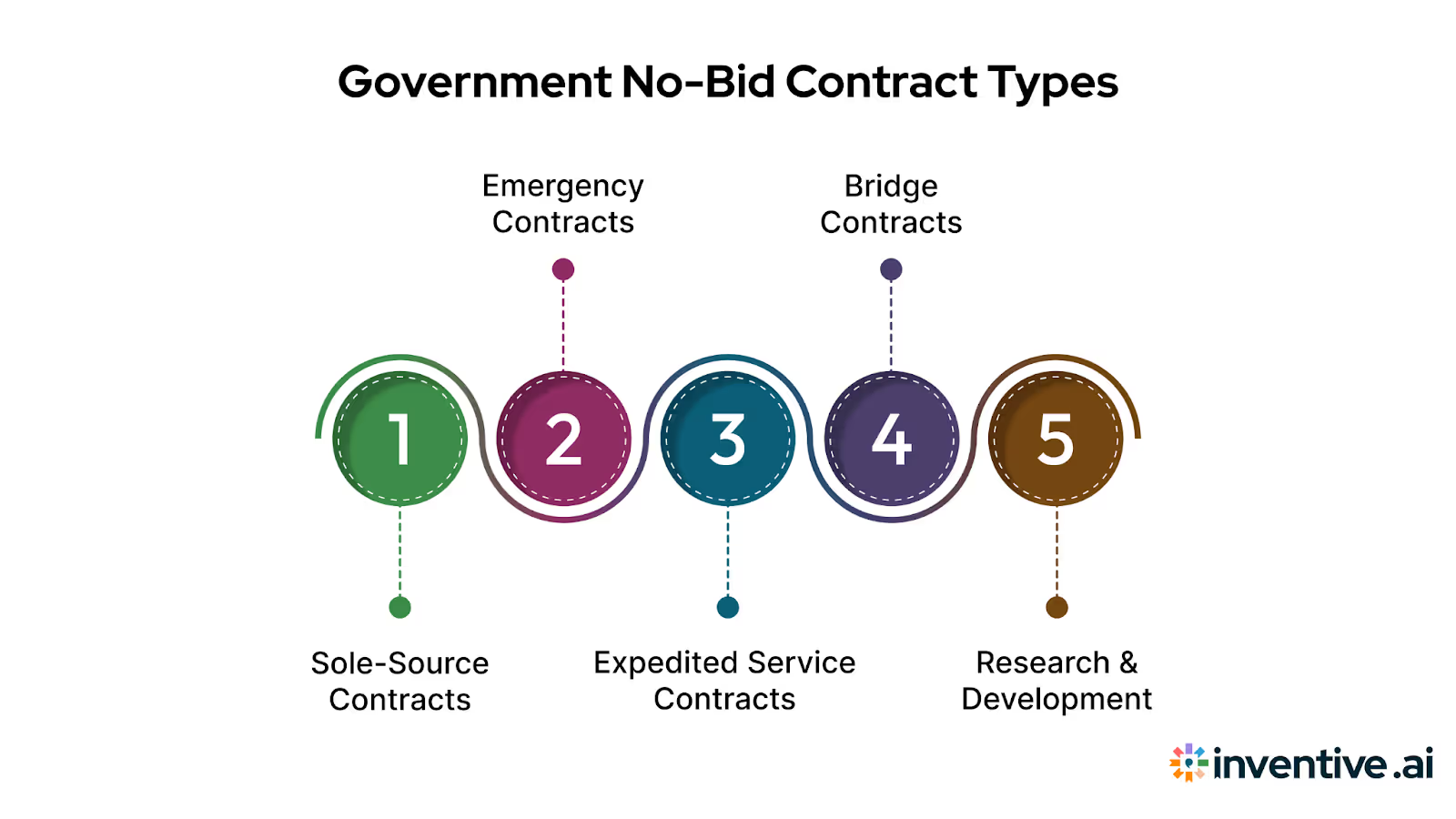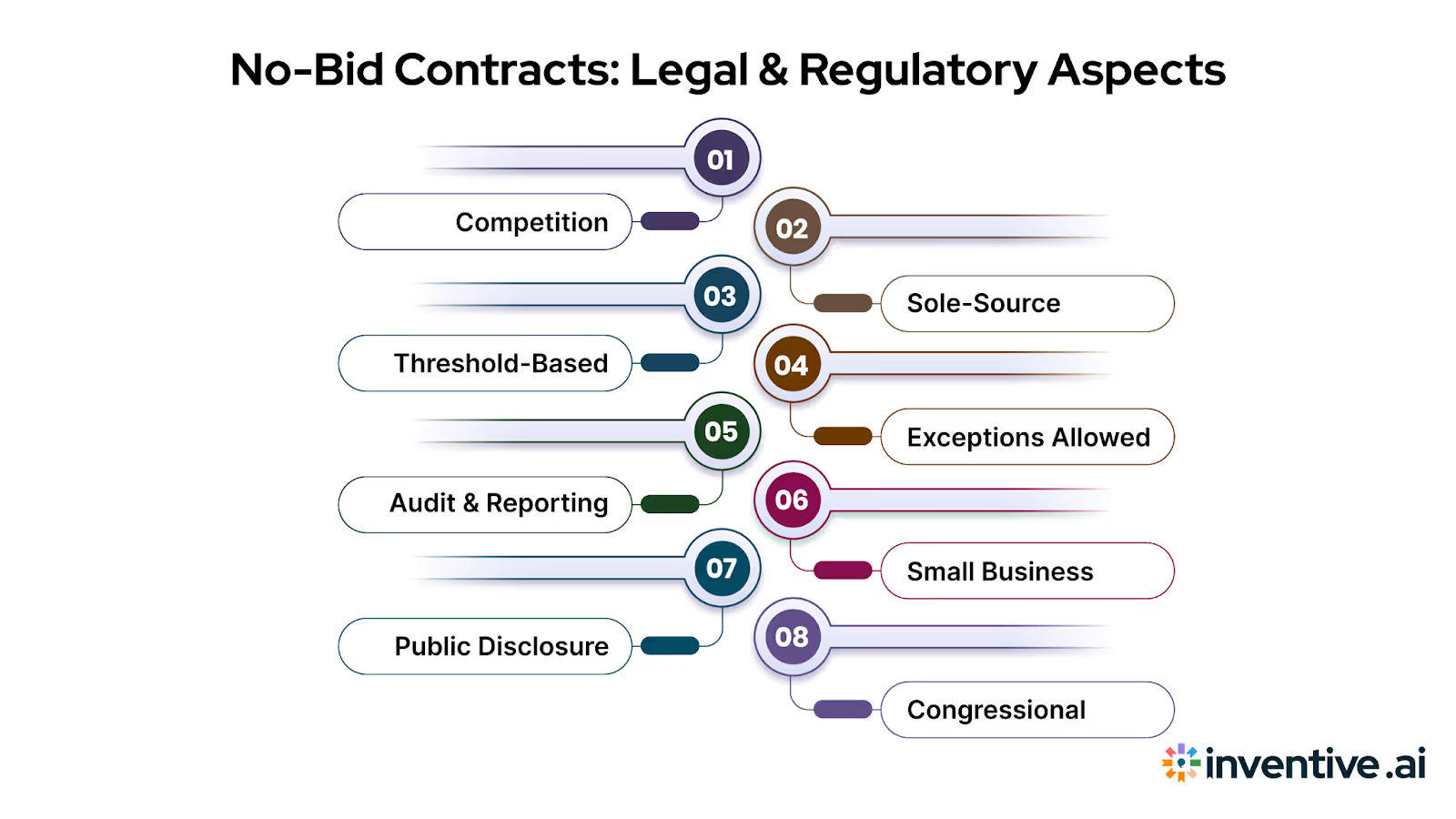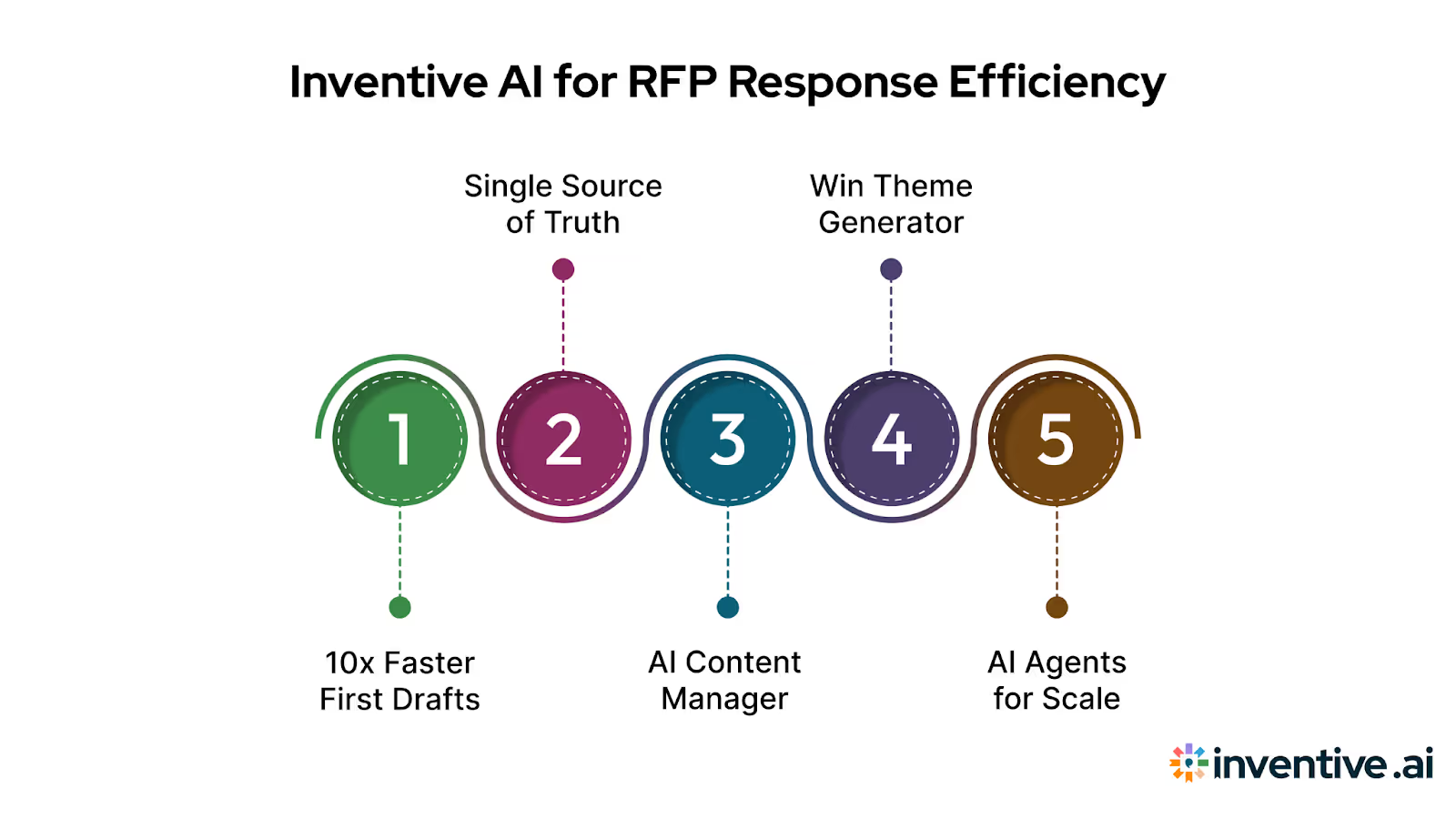Understanding No-Bid Contracts in Government Deals
Explore no-bid contracts' role in government, their strategic use in emergencies, and how they expedite procurement. Understand the benefits and challenges.

Ever notice why some government deals skip the competitive bidding process?
When $221 billion of the federal contracts awarded in a recent fiscal year lacked competition, questions about fairness, cost, and transparency naturally arose. That share represented nearly 30% of the total $753.8 billion federal contracts awarded.
For vendors, grasping how and when no‑bid contracts are used can open new opportunities while avoiding pitfalls. Misunderstanding the rules may mean missing high-value deals or entering risky agreements.
In this guide, you will learn why governments use no‑bid contracts, the legal rules that govern them, the benefits and risks for vendors, and how vendors can respond effectively in competitive procurement environments.
Key Takeaways
- No-bid contracts are awarded without competition, often due to urgency or unique proficiency.
- Governments use them for emergencies, national security, or when only one vendor qualifies.
- These contracts offer faster timelines and reduced administrative work for all parties.
- Risks include lack of pricing competition, public scrutiny, and potential legal challenges.
- Vendors must understand regulations and prepare strong proposals to succeed in such deals.
What are No-Bid Contracts?
A no-bid contract is a government agreement awarded without a competitive bidding process. Instead of inviting multiple bids, agencies directly select a vendor based on specific needs. These contracts are often used when speed, security, or unique expertise matters more than open competition.
For vendors, understanding no-bid contracts is essential. They offer a path to secure large deals without the pressure of underbidding rivals. But they also come with higher scrutiny, legal boundaries, and often require pre-established trust with the agency.
Agencies usually award no-bid contracts in emergencies, such as natural disasters, pandemics, or national defense operations. They’re also used when only one vendor can meet strict technical or performance standards. For instance, in healthcare, the Department of Veterans Affairs might directly assign a contract to a supplier with exclusive rights to a medical device.
Grasping how these contracts work helps vendors assess opportunities and avoid compliance risks. Understanding why governments choose this route adds more context.
Why Does the Government Sometimes Use No-Bid Contracts?
Government agencies need flexibility to act fast, especially when time, confidentiality, national-security, or valid experience are involved. No-bid contracts allow them to skip the competitive process and move directly to a trusted vendor.
In national security matters, such as defense or intelligence operations, open bidding could expose sensitive information. For example, the Department of Defense may award a no-bid contract to a defence tech firm with classified project experience.
During emergencies like natural disasters or health crises, time-sensitive needs take priority. The Federal Emergency Management Agency (FEMA), for instance, may contract a logistics firm immediately during a hurricane response.
Sometimes, only one vendor is capable of delivering a specialized product or service. It happens with patented technologies or proprietary systems, like a software company holding exclusive rights to a system used by federal agencies.
No-bid contracts help government work without delay, but they take different forms depending on need.
Types of Contracts Used by the Government Under No-Bid Arrangements

Not all no-bid contracts are the same. Depending on the situation, the government uses different contract types to meet its needs quickly and securely. For vendors, understanding the nature of each type helps shape better responses and set realistic delivery expectations.
Here’s a look at the most common types of no-bid contracts:
- Sole-Source Contracts
Sole-source contracts are awarded when only one vendor is capable of providing the required goods or services. It could be due to exclusive rights, patented technology, or unmatched technical expertize.
For vendors, this type of contract is common in defence or tech where a specific capability isn’t available from competitors. Sole-source contracts often come with detailed justification requirements from the buyer, so vendors must be prepared to prove their unique qualifications.
- Emergency Contracts
These are issued during events where speed is more important than process. Emergencies such as floods, pandemics, or wildfires may lead to contracts being awarded on the spot.
Agencies often rely on known vendors they trust to deliver without delay. Vendors who have a history of fast mobilization or emergency support capabilities can be strong contenders for such contracts, even without prior notice.
- Expedited Service Contracts
Sometimes services are not emergency-related but still need to be fast-tracked. For example, if a system failure affects essential operations like air traffic or hospital data, agencies may issue a short-term contract without competition.
Vendors with on-demand service models, high availability, and fast turnaround times are usually the first choice for such contracts.
- Bridge Contracts
Bridge contracts fill the gap between the expiration of one contract and the start of another. When rebidding is delayed or under review, agencies issue a short-term extension with the existing vendor.
For suppliers, it offers a continued revenue stream and a chance to prove value before the next open bidding cycle.
- Research and Development Contracts
These contracts are awarded when innovation or experimentation is required, and competitive bids are impractical. A federal agency may partner directly with a lab or tech startup to develop a prototype.
Vendors with niche expertize or IP assets often benefit from R&D contracts, especially when working on proof-of-concept projects for future government use.
- Confidentiality/Classified Project Contracts
Specific government projects involve national security, sensitive data, or crucial infrastructure where open bidding isn’t feasible. In such cases, contracts are awarded under strict confidentiality clauses to pre-vetted vendors with security clearances.
These contracts often relate to intelligence, cybersecurity, or defence technologies. Vendors must meet rigorous compliance standards, background checks, and data handling protocols. Being eligible for such contracts requires technical capability, proven trust, and a secure operating environment.
These contract types show how no-bid decisions vary based on urgency, complexity, and vendor capability. Each creates different opportunities and expectations for sellers.
Why Do No-Bid Contracts Work for Both Government and Vendors?
No-bid contracts may raise questions, but they offer clear advantages when used correctly. For both government and vendors, these deals can reduce delays, improve outcomes, and lower operating costs under the right conditions.
The benefits go beyond speed. Here’s how no-bid contracts support both sides:
When used in the right context, these benefits make no-bid contracts practical and productive. But they also come with risks. That’s where a balanced review of criticisms becomes essential.
Where No-Bid Contracts Can Go Wrong for Government and Vendors?
No-bid contracts often attract public scrutiny. Concerns around pricing, transparency, and fairness have sparked debates across sectors. While they offer efficiency, these contracts also carry risks for both sides if not managed carefully.
Here’s a balanced view of the common disadvantages:
Despite these challenges, clear rules help reduce misuse. Understanding legal protections and requirements is essential for vendors working in this space.
Legal and Regulatory Aspects of No-Bid Contracts

In the US, no-bid contracts are strictly regulated under the Federal Acquisition Regulation (FAR). FAR outlines when sole-source or non-competitive contracts can be awarded and under what safeguards. These rules ensure accountability while allowing flexibility during urgent or specialised procurements.
Here are the key legal and regulatory aspects every vendor should know:
- FAR Part 6 – Competition Requirements
It establishes the fundamental policy and procedures for promoting full and open competition in federal contracting, aiming to maximize value for the government while ensuring fairness, transparency, and equal opportunity for all capable vendors.
The purpose is to encourage wise use of taxpayer funds, stimulate innovation, and ensure no vendor is unfairly excluded.
- Sole-Source Justification
Contracting officers must document why only one vendor qualifies for a sole-source award, providing a written justification with sufficient factual basis and rationale, including why competition is not possible or appropriate.
This justification must be reviewed and approved by higher authorities, and the level of required approval depends on the contract value and nature of the procurement. It must also be certified for accuracy and completeness, with technical or requirements personnel providing and certifying the necessary supporting data.
- Threshold-Based Approvals
- Under $750,000: Contracting officer approval
- $750,000–$13.5 million: Head of the contracting activity
- Over $13.5 million: Senior procurement executive or agency head
- Exceptions Allowed by Law
Specific agencies like the Department of Defense (DoD) and FEMA have special authorities for direct awards during emergencies or wartime under the Defense Federal Acquisition Regulation Supplement (DFARS) and Stafford Act.
Department of Defense (DoD): The Defense Federal Acquisition Regulation Supplement (DFARS), specifically Part 218, grants the DoD special emergency procurement authorities. During emergencies or wartime, these authorities allow for simplified or non-competitive (including direct) awards in direct support of military operations or urgent contingency actions.
Approval and justification procedures are outlined in the DFARS, and authority is often delegated to the head of the contracting activity.
Federal Emergency Management Agency (FEMA): FEMA operates under special legal authority provided by the Robert T. Stafford Disaster Relief and Emergency Assistance Act (Stafford Act). During a Presidentially declared emergency or disaster, FEMA can rapidly award contracts (including direct awards) to provide necessary relief and response.
These actions are statutorily authorized and specifically designed to expedite response to disasters and emergencies
- Audit and Reporting Requirements
Non-competitive (sole-source) contracts, particularly those above the simplified acquisition threshold (currently $250,000 for most federal agencies), are subject to potential audit by the Office of Inspector General (OIG).
OIGs routinely review these contracts to ensure proper justification, documentation, price reasonableness, and compliance with federal regulations and agency policies
- Small Business and Socioeconomic Programs
Some no-bid contracts are awarded to 8(a) businesses or service-disabled veteran-owned firms under set-aside programs, bypassing full competition legally.
However, not all set-aside contracts are no-bid: Many set-aside contracts are still competitively bid among eligible program participants, but sole-source is explicitly permitted under these programs in defined circumstances
- Public Disclosure Rules
Award notices must be posted on SAM.gov, unless exempted for national security or classified programs.
But there are exemptions. Posting is not required if the contract award relates to national security, classified programs, or meets other specified exemptions outlined in FAR 5.202, such as awards resulting from the acceptance of unsolicited research proposals where publicizing would reveal proprietary or classified information.
- Congressional Oversight
For high-value or sensitive contracts, agencies must notify Congress and justify the use of a sole-source award. It includes providing the justification for why the contract could not be competitively awarded.
This oversight complements audit and inspector general reviews and contributes to limiting abuse or overly broad use of sole-source awards.
These rules aim to minimize misuse and protect public funds. For vendors, understanding these terms helps prepare stronger, compliant proposals and reduces legal risks. It also creates space to plan their sales and bid strategy more effectively.
Modern tools now help vendors meet these expectations without added manual effort. Now, let’s see what challenges sellers could face and tips to overcome them.
Challenges of No-Bid Contracts for Vendors
While no-bid contracts can provide vendors with valuable opportunities, they come with their own set of challenges. Vendors must be aware of these risks and take proactive steps to mitigate them:
1. Pricing and Cost Transparency
Without competition, vendors may face challenges in determining a fair price. There are no competing bids to help establish a benchmark, which could lead to pricing higher than expected or receiving scrutiny for pricing that may seem inflated. In addition, vendors may face cost overruns during the contract, as there is no competitive pressure to push prices down.
Tip for Vendors: Establish clear and detailed cost breakdowns and justify your pricing to prevent future disputes or audit scrutiny.
2. Increased Scrutiny and Accountability
No-bid contracts are often under intense public scrutiny. While these contracts may be legally justified, they often raise questions about favoritism, conflicts of interest, or fairness. Vendors are at risk of becoming embroiled in negative publicity, especially if the process is perceived as unfair or not transparent.
Tip for Vendors: Be prepared for more oversight, including audits, and ensure your internal processes are transparent and compliant with federal regulations to protect your reputation.
3. Limited Innovation and Vendor Input
Because no-bid contracts bypass the competitive process, vendors might find it harder to bring fresh solutions to the table. Without the need to compete against other vendors, there’s often less incentive to push the envelope or provide innovative solutions. This can result in limited growth opportunities for vendors who rely on differentiation and innovation.
Tip for Vendors: Leverage any opportunities within no-bid contracts to showcase unique capabilities or proprietary technologies, and seek ways to collaborate with the agency for long-term innovation.
4. Legal and Compliance Risks
No-bid contracts are subject to stringent legal and regulatory rules. If a vendor doesn’t meet these requirements, it can face serious legal consequences. Failing to comply with FAR and sole-source justification can result in penalties, audits, or disqualification from future contract opportunities.
Tip for Vendors: Ensure thorough knowledge of relevant compliance rules and work closely with legal experts to navigate the complexities of the procurement process.
5. Lack of Long-Term Stability
While no-bid contracts can provide immediate revenue opportunities, they may not always lead to long-term relationships with government agencies. Once the contract is completed, there’s no guarantee of being selected for future contracts, especially if your performance doesn't meet expectations or if the agency decides to move to a competitive bidding process.
Tip for Vendors: Build strong relationships and deliver outstanding results to increase the likelihood of repeat contracts and reduce the risk of being bypassed in future bidding opportunities.
6. Risk of Vendor Saturation
In certain sectors, such as defense or technology, the use of no-bid contracts may lead to a saturation of vendors, where only a handful of companies consistently receive these types of contracts. This could limit market opportunities for smaller or newer vendors looking to establish themselves in the government contracting space.
Tip for Vendors: Focus on niche markets or specialized offerings that set you apart from competitors and provide unique value to government agencies.
While these challenges are inherent in no-bid contracts, Inventive AI can help vendors streamline proposal processes and enhance response accuracy, enabling to navigate these opportunities with confidence.
How Inventive AI Helps Vendors Respond to RFPs Effectively?

Inventive AI is an AI-powered RFP response platform designed for vendors aiming to win bids efficiently. Our AI agents don’t generate content from scratch. Instead, they deliver responses with accuracy, speed, and context, assisting sales and proposal teams across tech, manufacturing, and government supply chains.
Here’s how it gives vendors a competitive edge:
- 10x Faster First Drafts: Drafts personalized to each RFP based on your past responses, brand voice, and product specs.
- Single Source of Truth: Bring all internal documents, past RFPs, and product info into one AI-powered knowledge base.
- AI Content Manager: Keeps your library fresh by updating stale content and flagging content gaps automatically.
- Win Theme Generator: Highlight strengths unique to your offering to improve win rates and differentiate your proposal.
- AI Agents for Scale: Automate low-value steps so your team can focus on strategy, pricing, and review.
- Enterprize-Grade Security You Can Trust: At Inventive, your data’s safety is non-negotiable. We are SOC 2 Type II compliant, audited by an independent firm. Our systems are benchmarked against five trust principles: security, availability, processing integrity, confidentiality, and privacy.
You can confidently manage sensitive RFPs knowing your information is safeguarded by Inventive AI’s industry-standard protocols.
Conclusion
No-bid contracts allow government agencies to award work without open competition, often under urgent or specialized circumstances. These contracts can speed up procurement timelines, reduce administrative overhead, and offer vendors the chance to build long-term relationships with federal buyers. They’re especially useful when dealing with national security, patented technologies, or single-source suppliers.
However, there are clear risks. Governments may face criticism over a lack of transparency, inflated costs, or potential bias. For vendors, no-bid contracts can lead to fewer opportunities for innovation and increased scrutiny over pricing and performance. Legal compliance, audits, and public perception remain constant considerations.
For vendors aiming to succeed in government deals, understanding when no-bid contracts apply and how to respond to competitive bids efficiently is important. Well-informed strategies improve both eligibility and outcomes.
Is your proposal team ready to reduce response time and increase win rates? Book a call with Inventive AI and check out how our AI-Powered RFP Response Software simplifies AI RFP Automation.
Frequently Asked Questions
1. What is a no-bid contract?
A no-bid contract is awarded by the government without a competitive bidding process. It’s typically used when only one vendor qualifies, time is limited, or the work requires specialized skills. These contracts bypass open competition but still require justification, documentation, and regulatory compliance.
2. Why do governments award no-bid contracts?
Governments use no-bid contracts in emergencies, for national security, or when a single supplier offers exclusive expertize or technology. These contracts allow faster procurement and ensure critical services or goods are delivered without delays caused by competitive bidding.
3. Are no-bid contracts legal in the US?
Yes, no-bid contracts are legal in the US under the Federal Acquisition Regulation (FAR). They must meet specific criteria, such as urgency or sole-source eligibility. Agencies must justify the award and follow strict documentation, oversight, and audit requirements to ensure transparency and fairness.
4. What are the risks of no-bid contracts for vendors?
Vendors face increased legal and audit scrutiny, especially over pricing and performance. Public perception can be negative if deals appear unfair. These contracts may also limit innovation due to the absence of competitive input. Failing to meet expectations can result in penalties or future disqualification.
5. Does Inventive AI help vendors respond to no-bid opportunities?
Inventive AI doesn’t manage no-bid awards directly but helps vendors prepare for related RFPs. It speeds up draft creation, manages reusable content, and improves proposal quality. This positions vendors better for both competitive and sole-source opportunities by improving responsiveness, accuracy, and win potential.

90% Faster RFPs. 50% More Wins. Watch a 2-Minute Demo.
Tired of watching deal cycles stall due to manual questionnaire back-and-forth, Dhiren co-founded Inventive AI to turn the RFP process from a bottleneck into a revenue accelerator. With a track record of scaling enterprise startups to successful acquisition, he combines strategic sales experience with AI innovation to help revenue teams close deals 10x faster.
Knowing that complex B2B software often gets lost in jargon, Hardi focuses on translating the technical power of Inventive AI into clear, human stories. As a Sr. Content Writer, she turns intricate RFP workflows into practical guides, believing that the best content educates first and earns trust by helping real buyers solve real problems.


